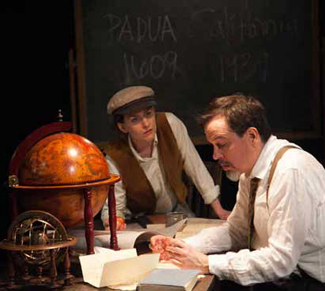
The word "science" calls forth many images. Henrik Ibsen cast it as the hero in An Enemy of the People, and Friedrich Durrenmatt, the villain in The Physicists. Its popular synonym, "technology," can be applied to Jonas Salk's polio vaccine or J. Robert Oppenheimer's atomic bomb. Are citizens who oppose unregulated experimentation promoting ignorance, however, or is their wariness of unforeseen consequences justifiable? Is it necessary for everyone to be aware of each new individual revelation brought to light, and, if not, who is to be trusted with this information? Bertolt Brecht's The Life of Galileo finds these, and many more, weighty questions in the legacy of a single event.
Even the playwright, himself, succumbed to ambivalence in his account of the turmoil surrounding 17th-century Italian scholar Galileo Galilei's assertion that the earth revolved around the sun--a proposal refuting centuries of Christian teachings. The play that began in 1938 as a simple facts-versus-faith/underdog-truth-versus-authoritarian dogma fable, in 1947 confronted the muddier problem of discoveries capable of destroying incautious pilgrims delving mysteries hitherto hidden from common mortals. Numerous translations, adaptations and scholarly analyses in the years since then have addressed this dilemma, with David Hare's providing the text for this Remy Bumppo production, directed by Nick Sandys.
The reason behind his choice, explains Sandys, was not merely Hare's dispensing with Brecht's more distracting presentational devices--songs and supertitles, among them--but "how Hare's liberal socialism combines with Brecht's repugnance at knowledge having become a commodity in the marketplace (the "death-dealers" as he called them)."
Given the variety of images coming to mind when we hear the word "science" or "technology," what face did Sandys decide to lend it in this production? "By setting the play in the period when Brecht was writing it, I hoped American audiences would see Galileo's conflict in a modern context, because the question is not whether science itself is 'good' or 'bad,' but whether its purpose is to alleviate the hardships of people's lives or to provide the powerful with products for their use--or misuse. In Galileo's time, the power rested in the church, but nowadays an anti-establishment play is not necessarily an anti-religious play.
"If there is any 'villain' in Brecht's argument, it's the capitalist establishment that promotes fear-mongering and political maneuvering to impose an ideology on matters wholly detached from such issues. Why must research be 'monitored' by the government, if not so that somebody or another can control the narrative, to the point of wrenching it from the hands of those closest to it? Is our own future being limited, or censored, or manipulated by those who would use it for selfish gains?"
Galileo had only to be threatened with torture by the Inquisition before acceding to their demands. Scholars speaking from the safety of several hundred years have faulted him for what they deem easy acquiescence. Amid the turmoil of our own time, Sandys is skeptical of looking to martyrs for guidance, "Brecht's Galileo is not the iconic grey-bearded magus of myth, but a flawed, arrogant, flesh-and-blood human being intelligent enough to acknowledge his own contradictions. This is what makes him a fully complex character affected by his environment, economy and culture--as are we all."
So what should we be contemplating as we go home after the show? Sandys sighs, "Initially, whether Galileo succeeds in smuggling a copy of his theories out of the country, in defiance of his oppressors--as Brecht claimed in his earlier version of the play--or whether the man we now worship as the 'father of modern science' truly sold out his principles in order to survive in an age when men could be, literally, executed for holding to their beliefs. More than that, though, we should consider the consequences of his actions, and the contemporary dimensions of Brecht's warning from over a half-century ago--now, when we have so many questions without answers. As Galileo himself says, "Where once there was belief, now there is only doubt."
The Life of Galileo runs at the Greenhouse through May 1.
Mary Shen Barnidge
Contributing Writer

 Follow Us On Twitter
Follow Us On Twitter